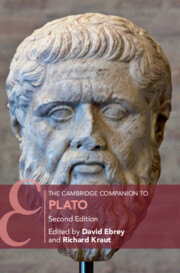Book contents
- The Cambridge Companion to Plato
- Other Volumes in the Series of Cambridge Companions
- The Cambridge Companion to Plato
- Copyright page
- Contents
- Contributors
- Acknowledgments
- Chronology
- Abbreviations
- 1 Introduction to the Study of Plato
- 2 Plato in his Context
- 3 Stylometry and Chronology
- 4 Plato’s Socrates and his Conception of Philosophy
- 5 Being Good at Being Bad: Plato’s Hippias Minor
- 6 Inquiry in the Meno
- 7 Why Erōs?
- 8 Plato on Philosophy and the Mysteries
- 9 The Unfolding Account of Forms in the Phaedo
- 10 The Defense of Justice in Plato’s Republic
- 11 Plato on Poetic Creativity: A Revision
- 12 Betwixt and Between: Plato and the Objects of Mathematics
- 13 Another Goodbye to the Third Man
- 14 Plato’s Sophist on False Statements
- 15 Cosmology and Human Nature in the Timaeus
- 16. The Fourfold Classification and Socrates’ Craft Analogy in the Philebus
- 17 Law in Plato’s Late Politics
- Bibliography
- Index Locorum
- General Index
- Other Volumes in the Series of Cambridge Companions (continued from page iii)
7 - Why Erōs?
Published online by Cambridge University Press: 21 July 2022
- The Cambridge Companion to Plato
- Other Volumes in the Series of Cambridge Companions
- The Cambridge Companion to Plato
- Copyright page
- Contents
- Contributors
- Acknowledgments
- Chronology
- Abbreviations
- 1 Introduction to the Study of Plato
- 2 Plato in his Context
- 3 Stylometry and Chronology
- 4 Plato’s Socrates and his Conception of Philosophy
- 5 Being Good at Being Bad: Plato’s Hippias Minor
- 6 Inquiry in the Meno
- 7 Why Erōs?
- 8 Plato on Philosophy and the Mysteries
- 9 The Unfolding Account of Forms in the Phaedo
- 10 The Defense of Justice in Plato’s Republic
- 11 Plato on Poetic Creativity: A Revision
- 12 Betwixt and Between: Plato and the Objects of Mathematics
- 13 Another Goodbye to the Third Man
- 14 Plato’s Sophist on False Statements
- 15 Cosmology and Human Nature in the Timaeus
- 16. The Fourfold Classification and Socrates’ Craft Analogy in the Philebus
- 17 Law in Plato’s Late Politics
- Bibliography
- Index Locorum
- General Index
- Other Volumes in the Series of Cambridge Companions (continued from page iii)
Summary
One of the ways in which Plato has captured the popular imagination is with the claim that the philosopher can feel ers, passionate love, for the objects of knowledge. Why should Plato make this claim? In this chapter, I explore Plato’s treatment of philosophical ers along three dimensions. First, I consider the source of philosophical ers. I argue that it is grounded in our mortality and imperfection, which give rise to a desire for immortality and the immortal. Second, I turn to the object of philosophical ers. I suggest that it is an arresting response to beauty, through which we come to value the ideal properties of the forms. Finally, I address the nature of ers. I claim that it is a focusing desire, that overrides other concerns and causes us to overwhelmingly focus on its object. I conclude the chapter by considering the problem Vlastos famously raises for Plato’s account of ers: can it do justice to disinterested, interpersonal love? In agreement with Vlastos, I claim that one who comes to grasp the forms will cease to feel interpersonal love; however, I also suggest that ers can give rise to philia, beneficent concern with the wellbeing of others.
Keywords
- Type
- Chapter
- Information
- The Cambridge Companion to Plato , pp. 202 - 232Publisher: Cambridge University PressPrint publication year: 2022

